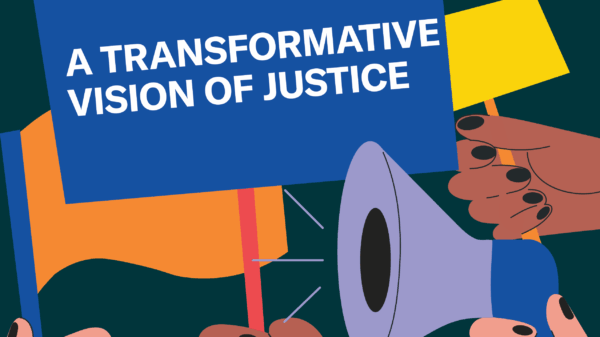The ACLU of New Jersey today released a report, Decarcerating New Jersey: A Transformative Vision of Justice, which includes newly acquired statewide data on incarceration and policy recommendations that can serve as a national model for decarceration. After decades of dedicated advocacy, the ACLU-NJ has helped lay the foundation for reimagining the criminal legal system in New Jersey through policy change that has reduced the state’s prison population by more than 50 percent since 2011. Despite this historic reduction, New Jersey prisons continue to have the highest rate of racial disparity in the nation, making decarceration fundamental to racial justice here, and beyond.
“Reducing our prison population is not only about freedom – it’s about our state’s moral compass, racial justice, economic opportunities, healthier communities, and more,” said ACLU-NJ Executive Director Amol Sinha. “New Jersey deserves credit for leading the country in decarceration, but there is more to do. Surrounding every person impacted by incarceration is a family, a community, and multiple generations that are also affected. New Jersey can and must disrupt the cycles of mass incarceration – now is the time to continue our transformative decarceration trajectory.”
Following the ACLU-NJ's 2017 report, A Vision to End Mass Incarceration in New Jersey, the 2023 report focuses on state data from 2017-2022, a period when New Jersey led the country in prison reductions. Decarcerating New Jersey rejects fearmongering and “tough-on-crime" policies that only further drive mass incarceration and division: data shows that violent crime is trending downward in tandem with drastic reductions in the state’s incarcerated population.
“New Jersey should be proud of its historic decarcerative progress, which has proven that comprehensive transformation of our criminal legal system is possible,” said ACLU-NJ Director of Supreme Court Advocacy Alexander Shalom. “We've seen ambitious change succeed before: New Jersey's bail reform model has led to sweeping reductions in the state's incarcerated population and is widely considered to be the nation’s gold standard. We must not let fearmongering and misinformation threaten our transformative vision of racial and social justice.”
Key report findings include:
- Criminal legal reforms spearheaded by the ACLU-NJ and partners have helped New Jersey reduce its prison population by more than 50 percent since 2011.
- Although pretrial incarceration has increased since the onset of the COVID-19 pandemic, New Jersey still incarcerates thousands fewer people than it did before bail reform.
- In an urgent effort to save lives during the COVID-19 pandemic, a first-if-its-kind law took important steps to confront mass incarceration: the Public Health Emergency Credit law led to the release of nearly 9,000 people and can serve as a model for future decarceration.
- New Jersey’s prison population is aging. Now more than one eighth of the people in prison are over 55 years old; more than 30 percent of people in prison are 45 or older. Incarcerating older people is expensive and rarely needed to promote public safety.
The full data can be viewed here.
New Jersey has positioned itself as a national leader in criminal legal reform efforts toward decarceration thanks to successful policy changes achieved by the ACLU-NJ and partners including bail and pretrial detention reform, implementation of the first-of-its kind Public Health Emergency Credit law (PHEC) which enabled early releases during COVID-19, and cannabis legalization and decriminalization. With each of these successful efforts, New Jersey gets closer to achieving racial and social justice.
“The Public Health Emergency Credit law was passed to save lives during the pandemic, but it demonstrated that decarceration at the largest scales is possible, and necessary, to begin addressing the harms of mass incarceration,” said ACLU-NJ Policy Director Sarah Fajardo. “This law is one of the most significant modern policies for decarceration in the nation, and the resulting releases marked a groundbreaking moment for public health and criminal legal reform. It proved that wide-sweeping decarceration in the name of racial justice and with the leadership of impacted people can happen without any impact on public safety – and it made it clear that New Jersey can, and must, go even further.”
To build upon this successful foundation, the ACLU-NJ recommends the following policy changes:
- Implementing Categorical Clemency: Categorical clemency enables groups of people to be considered for commutations and pardons based on shared characteristics.
- Ending Mandatory Minimums: For decades, these laws have fueled longer prison sentences and exacerbated racial disparities without improving public safety.
- Increasing Access to Compassionate Release: New Jersey has unnecessarily high standards to receive compassionate release despite age, illness, or other factors that make people unlikely to reoffend.
- Decriminalizing Drugs: In treating drug use as a public health issue instead of a crime, New Jersey must prioritize harm reduction and access to opportunity.
New Jersey must build on its proven foundation for decarceration by implementing data-driven policies in collaboration with those who are impacted most. As far too many people remain incarcerated in state prisons and jails, New Jersey has an obligation to build healthier communities by reimagining the criminal legal system as we know it. To move toward racial and social justice, New Jersey must embrace major, transformative change.
Stay Informed
Sign up to be the first to hear about how to take action.
By completing this form, I agree to receive occasional emails per the terms of the ACLU’s privacy statement.
By completing this form, I agree to receive occasional emails per the terms of the ACLU’s privacy statement.


